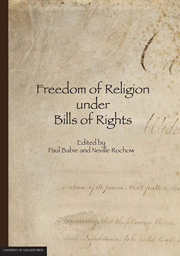Book contents
- Frontmatter
- Contents
- Acknowledgments
- List of Contributors
- Foreword by The Hon Sir Anthony Mason AC KBE: Human Rights and Courts
- INTRODUCTION
- SETTING THE SCENE
- CONTEMPORARY FREEDOM OF RELIGION ISSUES
- 5 Defamation and Vilification: Rights to Reputation, Free Speech and Freedom of Religion at Common Law and under Human Rights Laws
- 6 Should an Australian Bill of Rights Address Emerging International Human Rights Norms? The Challenge of ‘Defamation of Religion’
- 7 Christian Concerns about an Australian Charter of Rights
- 8 Apostasy in Islam and the Freedom of Religion in International Law
- COMPARATIVE EXPERIENCE WITH FREEDOM OF RELIGION
- TABLE OF LEGISLATION AND INTERNATIONAL INSTRUMENTS
- INDEX
5 - Defamation and Vilification: Rights to Reputation, Free Speech and Freedom of Religion at Common Law and under Human Rights Laws
from CONTEMPORARY FREEDOM OF RELIGION ISSUES
Published online by Cambridge University Press: 05 June 2013
- Frontmatter
- Contents
- Acknowledgments
- List of Contributors
- Foreword by The Hon Sir Anthony Mason AC KBE: Human Rights and Courts
- INTRODUCTION
- SETTING THE SCENE
- CONTEMPORARY FREEDOM OF RELIGION ISSUES
- 5 Defamation and Vilification: Rights to Reputation, Free Speech and Freedom of Religion at Common Law and under Human Rights Laws
- 6 Should an Australian Bill of Rights Address Emerging International Human Rights Norms? The Challenge of ‘Defamation of Religion’
- 7 Christian Concerns about an Australian Charter of Rights
- 8 Apostasy in Islam and the Freedom of Religion in International Law
- COMPARATIVE EXPERIENCE WITH FREEDOM OF RELIGION
- TABLE OF LEGISLATION AND INTERNATIONAL INSTRUMENTS
- INDEX
Summary
Laws prohibiting religious vilification (or religious ‘hate speech’) are controversial and often criticised. On the one hand, it seems obviously wrong that someone should be insulted and humiliated on the basis of his or her religious commitments. But how far should the law go in putting controls on freedom of speech? Critics charge that religious vilification laws amount to an undue restriction of freedom of speech, and in fact may generate, rather than reduce, acrimonious religious debate in multicultural and multi-faith societies.
This chapter is sympathetic to those critiques. But the particular angle it addresses is this: are religious vilification laws really necessary? The common law has dealt with verbal attacks on others for many years through the law of the tort of defamation. I suggest that many of the aims of those who propose religious vilification laws can be met by noting the remedies that are available under the ordinary law of defamation. In addition, I suggest that some of the concerns raised by opponents of the laws are met by the various defences and qualifications that have developed in the defamation area.
This chapter serves as a preliminary study, but I hope that it may at least open the way for further research on a topic that will become increasingly contentious. At the very least, I hope that the chapter illustrates that the adoption of further protection for human rights in Australia, including for freedom of religion, does not assume the adoption of religious vilification laws, and indeed, may be a further reason not to introduce such laws.
- Type
- Chapter
- Information
- Freedom of Religion under Bills of Rights , pp. 63 - 85Publisher: The University of Adelaide PressPrint publication year: 2012
- 3
- Cited by



